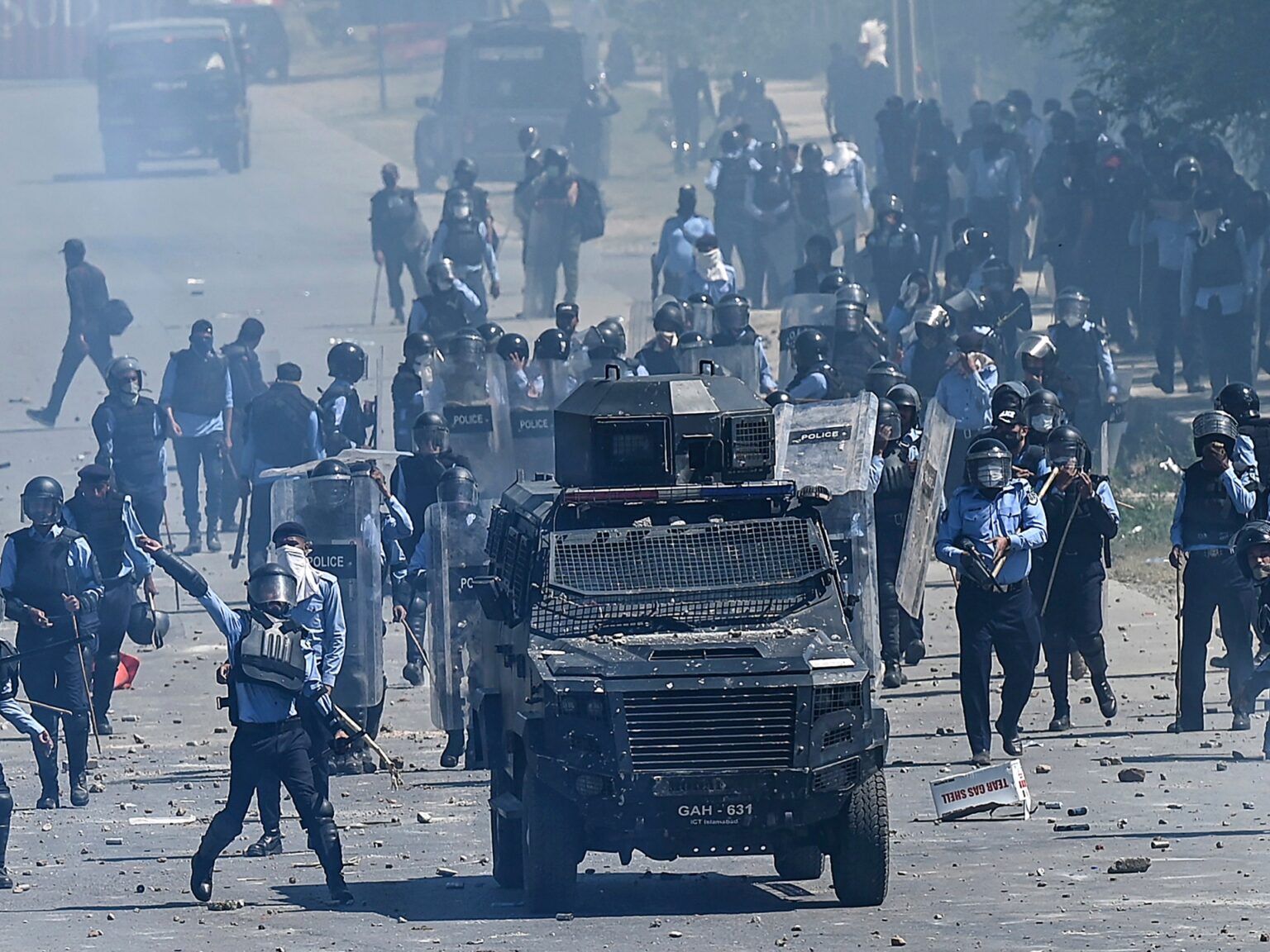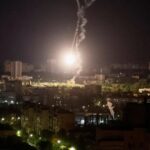Global Courant 2023-05-18 13:03:23
Islamabad, Pakistan – As soon as Akram* saw the news last week that Imran Khan had been arrested, he thought of stepping out and protesting what he said was a “kidnapping” of a former prime minister.
“I have sent a message to our WhatsApp group of PTI supporters (Pakistan Tehreek-e-Insaf) asking them to gather outside to protest this illegal act,” the 40-year-old told Al Jazeera on Wednesday on condition of anonymity due to fear. for his safety.
Akram, a marketing professional, joined some 80 others who took to the streets in Karachi, Pakistan’s largest city, to demand the release of Khan, who was detained by paramilitary forces on corruption charges on May 9 when he appeared before a court in the capital. , Islamabad, for another case.
“We had signs and chanted slogans to support Khan. Initially, uniformed police officers came to us and strictly told us not to block roads or cause social unrest. But within half an hour, a group of plainclothes police officers came and picked up more than 40 of us, threw us into a police car and took us to a prison,” Akram told Al Jazeera.
Imran Khan arrives to appear at the Supreme Court in Lahore, Pakistan (File: Arif Ali/AFP)
He added that he was taken to five different police stations before being placed “in a small cell” with more than 30 others.
“The conditions were appalling and there was barely room to breathe. The police held me without reporting for two days before releasing me,” Akram said.
His May 11 release came on the same day the Supreme Court declared Khan’s arrest illegal. The arrest had sparked 48 hours of violence across the country with rioting, arson and vandalism against public and private property, including military installations.
The clashes left more than 10 people dead and thousands arrested, many of them senior PTI leaders.
Fear of military lawsuits
Amir Mir, the interim information minister of the Punjab province, where more than 3,200 people were arrested, said those accused of attacking the residence of the top military commander in the eastern city of Lahore and other military buildings military courts will be tried.
“The perpetrators were only identified after 100 percent confirmation of their involvement in the attacks. We will make an example of it so that no one dares to repeat it in the future,” Mir told reporters on Wednesday.
On Tuesday, Pakistan’s National Security Committee (NSC) approved the military’s decision to try those involved in the riots under the country’s draconian military laws, which override civilian courts.
The military courts are separate from Pakistan’s civilian justice system, where the judges are members of the military’s legal branch. The hearings take place at military installations to which the media have no access. If a person is convicted, he has no right to appeal to another court.
International rights organizations and groups in Pakistan have strongly criticized the decision to use military courts to try civilians, arguing that this threatens to violate their right to a fair trial.
HRCP strongly opposes the use of the Pakistan Army Act 1952 and Official Secrets Act 1923 to try civilians. While those responsible for arson and damage to public and private property during the recent protests must be held accountable, they retain the right to a fair trial. 1/2
— Human Rights Commission of Pakistan (@HRCP87) May 16, 2023
The Pakistani military is a dominant player in the political affairs of the country and has ruled it directly for over three decades since 1947.
Khan, who was ousted last year by a parliamentary vote of no confidence, has repeatedly blamed army chief General Syed Asim Munir for his arrest and crackdown on the PTI.
Both the government and the army singled out Khan for inciting hatred against the army and said those involved in last week’s riots will be brought to justice.
In a statement on Wednesday, the army, quoting the army chief, said that “the recently planned and orchestrated tragic incidents will never be allowed again at any cost.”
Family members arrested
While relatives of those arrested in the crackdown were too afraid to talk about it for fear of state retaliation and harassment, others did.
Azhar Mashwani, a Lahore-based PTI employee, said he was not in his hometown of Lahore when he was informed that his 73-year-old father and brother had been picked up from their home.
“My house where my parents, my wife and my brother’s family all live together was raided three times on May 10th by plainclothes officials… (They) asked for my whereabouts and when they came for the third time they took my father and brother,” Mashwani told Al Jazeera by phone from Lahore, where he is hiding in an undisclosed location.
He added that while his family also supported the PTI, none of them had attended the protests last week.
“My brother is a university professor and has four children. My father is retired and in poor health. Yet they were arrested and under constant pressure to reveal my location,” Mashwani told Al Jazeera.
“My father was returned after three days, but we have no idea where my brother is. We haven’t spoken to him in the past six days. His children have not gone to school.”
Mashwani, who is a member of the PTI’s social media team, was arrested by police for more than a week in April, taken to several cities and forced to take a lie detector test where he was questioned about his role in the party. No formal charges have been filed against him. Mashwani called it a “kidnapping”.
‘I don’t know what to do’
A similar story was recalled by Atique Riaz, a 43-year-old accountant in Lahore and a father of two. His wife, Sanam Javed Khan, was arrested on May 10 and is still in custody.
“Sanam is a big PTI supporter and she protested in the streets of Lahore on May 9, but she was not part of any violence or riots,” Riaz told Al Jazeera.
“My wife was attending another demonstration on Wednesday when I received a call from her that she had been arrested by the police along with 17 other women.”
Riaz said he was able to see his wife in the detention center for the first five days after her arrest, but has had no contact since Monday evening. He does not know where his wife has been taken.
‘I don’t know what to do. My children have not stopped crying and calling for their mother,” Riaz said, adding that he has barely slept in the past week.
“I don’t know if my wife will be tried under army law or not. I don’t even know what charge she’s being held on. She wasn’t even involved in any kind of arson.”
Hammad Azhar, a senior PTI leader who has so far evaded arrest for last week’s violence, said the decision to try protesters under army law “is being taken to intimidate and victimize the party”.
“In the 14 months since this ruling alliance has been in government, democratic norms have been ripped away. The decision to establish military tribunals by the NSC is just another series in this long chain of events,” he told Al Jazeera from an undisclosed location in Lahore.
However, Akram, the Karachi-based marketing professional, said he felt no anger towards the security forces when he was released from jail.
“I just felt sorry for the people who work for these institutions and who have to follow the instructions of their bosses. These people in uniform need freedom. Only a handful of people at the top defame the military for their actions. They must be held accountable. This persecution cannot go on forever.”
*Name changed to protect individual’s identity.








